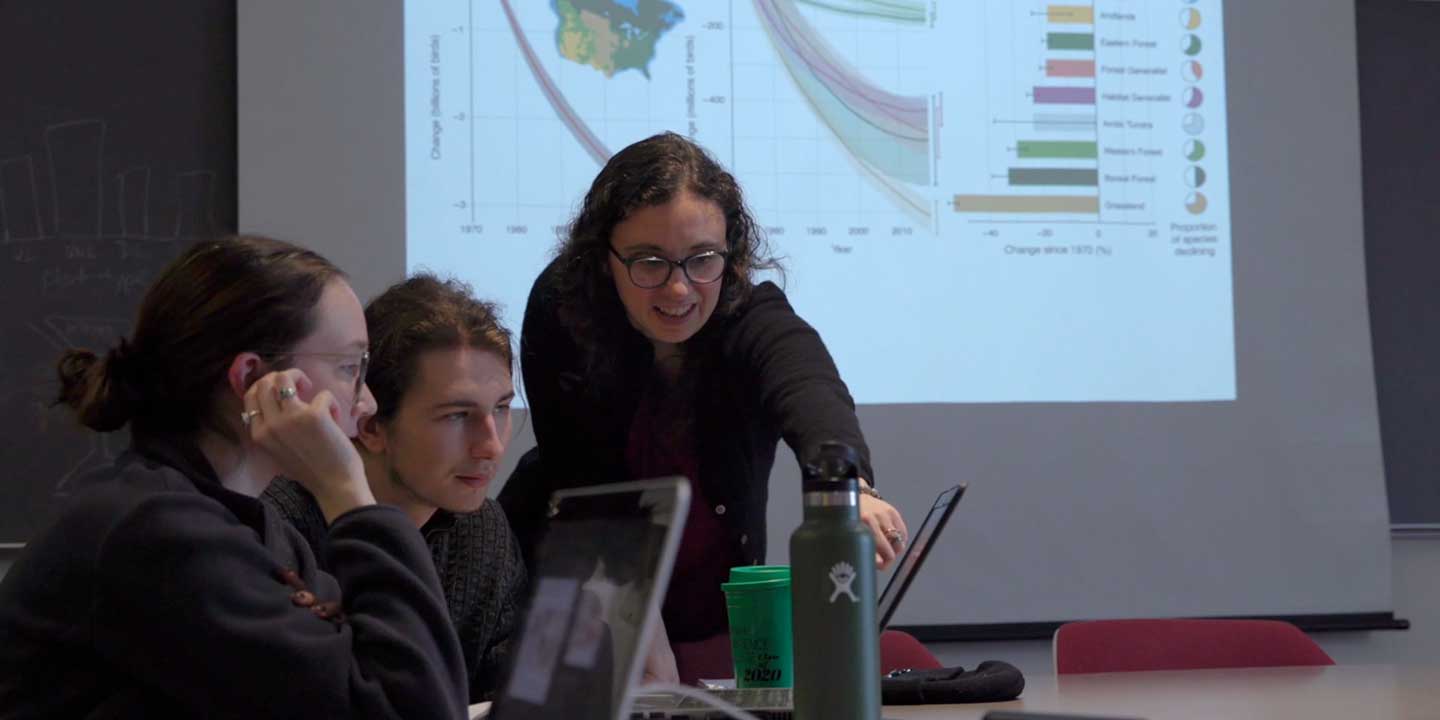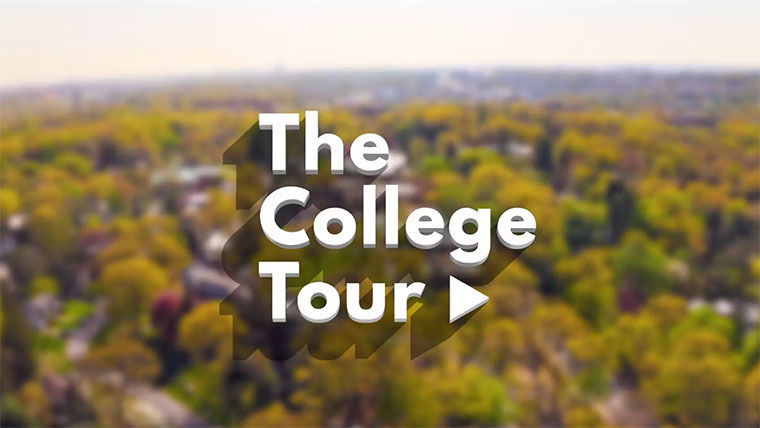Our Approach
Seminar-Conference Courses: Where 10:1 Becomes 1:1
At Sarah Lawrence, 90 percent of classes are small, round-table seminars—all taught directly by faculty.
- Every semester, for each of your seminar classes, you will complete conference work: an in-depth, individual project developed in collaboration with faculty during bi-weekly, one-on-one meetings. Each conference project is an opportunity for you to demonstrate your subject mastery by creating original work that builds upon the course in ways that you—and only you—can imagine.
- Your conference work may be an academic research paper, a piece of creative writing, a staged reading, a scientific inquiry, or fieldwork. Conference work at Sarah Lawrence reflects your passions, interests, and aspirations, so projects take many forms and directions.
Conference work—and the one-on-one collaboration with faculty on which it is based—plays a crucial role in your studies; it is at the center of the Sarah Lawrence approach. Students and alumni consistently cite conference work as the most meaningful aspect of their Sarah Lawrence experience. Working closely with professors—on all your conference projects—gives you the opportunity to see how experts in the field work and think, close up. There’s no better way to prepare for your future.
The Donning System: Faculty Advising from Day One
Rather than follow a prescribed set of requirements for a major, students work with their faculty adviser, or “don,” to plan their courses of study. Your don will be your close adviser throughout your four years and will help you connect the subjects and disciplines that interest you most.
As the teacher of your First-Year Studies course, your don will get to know you right away. In weekly one-on-one meetings, you will build a relationship that will form the basis for ongoing mentorship—not only in course selection advice, but also in helping you develop your strengths and flourish at the College and beyond graduation. At least one major study has shown that college graduates cite access to a mentor as the aspect of their education that had the most positive impact on their success after school. Access is paramount at Sarah Lawrence.
Studying the Arts at Sarah Lawrence
Visual Arts
The visual arts include study in painting, sculpture, photography, filmmaking, printmaking, drawing, digital imagery, and visual fundamentals. Visual arts courses are taught in the seminar/conference format. However, students may supplement with workshops to expand their skills, widen their experience, and form stronger bonds across disciplines.
Some visual arts courses require a workshop. Common workshop topics include figure drawing, color theory, Photoshop, woodworking, and experimental printmaking.
Music, Dance, and Theatre
Students who choose to pursue courses in the performing arts work with their don and an appropriate faculty member to design a program of study that integrates theory and practice. This program is called a “Third”—literally a third of each student’s course load for that semester or year.
Here is how Thirds work for each arts discipline:
Music
A typical Music Third includes work in several components, one of which is the central area of study (instrumental performance, composition, or voice). The other components include a theory and/or history course, a performance ensemble (chorus and/or orchestra, chamber music, etc.), and concert attendance. More advanced components focus on specific periods of music history, particular music forms, and more specialized musical theory and applications.
Dance
In consultation with faculty, dance students develop Thirds that integrate creative, technical, and analytic dance practices. Students are required to participate in at least one physical practice class five days a week, choosing from contemporary dance styles, classical ballet, West African dance, Yoga, T’ai Chi Ch’uan, and other kinetic forms offered on a year-to-year basis.
Dance students study improvisation and/or composition each semester and are encouraged to study dance history as they enter the program. Functional anatomy, based on the work of Irene Dowd, is also recommended. Students also may make a selection from components such as music for dancers, Labonation, lighting design and stagecraft, teaching conference, and performance projects, as offered. Individual programs combine personal choice and logical progression within the dance curriculum.
Theatre
Beginning students enroll in Gateway to Theatre, a two-course sequence introducing the history of theatre and a wide range of technical theatre skills. All students work with the theatre faculty to construct an individualized Theatre Third, which consists of several components selected from areas of study such as acting, directing, design, playwriting, and courses in developing original interdisciplinary material—based on the student's level and focus.
Other Course Formats: Making Coursework Your Own
Lecture Courses
Sarah Lawrence offers a number of lecture courses designed to give students a broad view of a subject area. These courses are supplemented by group conferences, during which small groups of students from the class meet together with the professor every other week.
Language Third
To encourage students to study more than one foreign language at the same time, Sarah Lawrence offers sophomores, juniors, and seniors the option of taking a Language Third. This allows students to study two languages as one-third of their program. Students also have the option to combine a language course and a lecture course as one-third of their program.
Science and Mathematics Third
A similar option is available to appropriate students in biology, chemistry, computer science, mathematics, and physics. Students may take two courses in science and/or mathematics as one-third of their program.
Conference Courses
Conference courses are available to all but first-year students and first-semester transfers. Together with a faculty member, advanced students may design an individual course in order to study subject matter not covered in the regular curriculum. Conference courses are conducted through weekly meetings between the student and faculty member and must be approved by the student’s don and the committee on student work.
Recent conference courses have included “Revolution in Physics,” “Shakespearean Scene Design,” “Studies in Film Noir,” “Experimental Genetics,” “Plato’s Symposium,” “Women and The Decameron,” and “The Modern Middle East.”
Directed Study: Fieldwork, Internships, Independent Study, and Senior Thesis
Independent Study
Independent study is intended for juniors and seniors with strong academic records who seek to develop an individual project of research, creative work, or intensive reading. Such study may result in a major work such as a thesis, a literary work, or a musical composition. The appropriate committees grant permission for independent study, and the work must be planned with members of the faculty.
Fieldwork and Internships
Many students combine theory and practice by doing internships during their college years. Students may earn academic credit for internships by combining them with independent academic study under the supervision of a faculty member. This arrangement is called fieldwork. Recent fieldwork projects have included work in government agencies, in residential agencies for emotionally disturbed children, in film projects, in foundations, in performing arts festivals, in museums and galleries, and in television. Visit the Office of Career Services site for more information on internships and fieldwork.
Senior Thesis
Students in their senior year may choose to devote one-third of their program to a senior thesis. The thesis is interdisciplinary and is completed over the course of an academic year with a committee of two or three faculty members chosen by the student. One faculty member serves as the chief sponsor, while the others bring the insights and methods of their disciplines to bear on the project.
Students who register for a senior thesis are responsible for meeting with each of their sponsors and keeping them informed of their progress. All faculty sponsors read the final thesis and provide comments to the chief sponsor.
More Than Grades: Modes of Student Evaluation
Sarah Lawrence challenges students to exceed expectations and provides them with carefully considered feedback, avoiding a simplistic emphasis on grades. There are three modes of student evaluation used at the College:
Critical Abilities Assessment
The College has established six critical abilities essential for students’ personal and professional success.
The ability to…
- Think analytically
- Express ideas effectively through written communication
- Exchange ideas effectively through oral communication
- Bring innovation to their work
- Envisage and work independently on a project
- Accept and act on criticism
These skills set Sarah Lawrence graduates apart in a competitive career landscape. Faculty members use a web-based assessment platform designed to measure student performance against these critical abilities. This assessment is used in conjunction with written evaluations and traditional grades.
In-depth Narrative Evaluations
A detailed written evaluation of student work in each course gives students the feedback they need to understand their strengths and how they can improve. Through these written evaluations, Sarah Lawrence students:
- Learn how their work has evolved over the past term
- Receive suggestions about what they should read or think about to move their work forward
- Gain better understanding of their most significant accomplishments in each course
Traditional Grades
While emphasis is never on grades, letter grades are assigned for all completed classes and are recorded on each student's transcript.
Together, these three modes of evaluation provide a comprehensive, personalized assessment for every student in every course for every semester. Faculty members are able to address not only a student’s performance, but also the specific aspects of, and reasons behind, a student’s performance.

